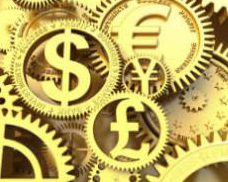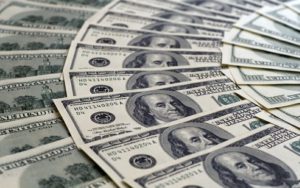Why cash is indispensable in times of crisis
The Lehman bankruptcy in 2008 made it clear how shaky the global financial system is. Most Western countries will never be able to pay off their debts, so total collapse is inevitable. It is still being delayed by taking on more debt. How can we survive if a huge crisis actually occurs?

I start my considerations with a question: What would disappear from this earth if all debts and credits were cancelled overnight? The answer is simple: No real goods. Actually, nothing vital. The grain will continue to grow undeterred and the cows will continue to give milk. At this point it becomes clear where the priorities will lie after a collapse. First of all, it will be a matter of sheer survival. Secondly, world trade will have to be reorganized. But we can take our time with that, and that raises the next question: What would occur if, for example, no cars were produced for a year or two? Nothing either, because there are already enough cars.
But what will trigger the big collapse? It will be the US dollar, which will no longer be accepted as a means of payment for delivered goods due to the enormous debt and foreign trade deficit of the USA. On June 9, 2024, the US dollar lost its attractiveness. Saudi Arabia did not extend the contract that obliged it to only sell oil for dollars. This means the end of the so-called petrodollar, and the petrodollar was the only reason why US dollars were in demand after it had not been backed by gold since 1971.
But if the US dollar loses massive value, all – yes, all – balance sheets of international financial institutions will go down the drain. The inevitable consequence will be that not a single electronic payment system will be functional anymore. Soon the euro will follow suit. World trade as before will no longer be possible and so it makes sense to carry out further considerations with the possible extreme case that as a result all debts and credits will actually become worthless, i.e. effectively cancelled.
And when might this take place? I am not a clairvoyant, so I assume that it could occur this year, or within the next three years at the latest. After all, the West is working hard to destroy trust in the dollar. By freezing, or rather stealing dollar assets from states that are to be ‘punished’, such as Russia. Or even giving stolen assets to countries like Ukraine. So, who in the future will be so naive as to invest assets in US dollars that can then be frozen at will? Even after the USA’s shameful withdrawal from Afghanistan, the USA simply froze seven billion in Afghan assets.
2024 is not 1929
A collapse today cannot be compared to the great crisis of 1929. Back then there was a permanent shortage, whereas today we have abundance almost everywhere. So, after a collapse the main action should be to continue to distribute this abundance to the people. The food should get to the people. And without delay, because, for example, the dairies have to continuously process the milk and pass it on to the people.
But how is that supposed to work when all virtual money is worthless, virtually cancelled? One aspect should be clear: it will not work without a command economy. But what would a command economy mean in this situation? First and foremost, it needs to be ensured that no one has to starve. In other words, the food supply should have absolute priority.
Then comes the distribution system. Who can buy what, when, and how much, and how should it be paid for? Panic buying needs to be prevented because it creates shortages where there actually aren’t any. Let’s remember corona and toilet paper. But should we station police or soldiers in front of supermarkets to control or even decide what people are allowed to take out of the stores? That doesn’t sound good. Is there an alternative?
To do this, we need first consider what value is assigned to money and what form of money can still be accepted. After all, money is the means of exchange that we need for every purchase. In practical terms, there is no reason to change the internal value of money. But what money should we use to buy and pay when all virtual money is canceled? By virtual money I mean all money that no longer exists in the form of bits and bytes in computers.
Cash does not disappear
This brings me back to the assumption that nothing has disappeared from the face of the earth except this virtual money. Physical cash is not affected by this and there is enough of it to carry out all day-to-day transactions. If the financial system has collapsed, there will no longer be any banks that can show a proper balance sheet. In principle, they are all bankrupt, but their branches still exist and their employees are able to work. This means that they can take on tasks even in a command economy. These banks also still have cash reserves, just as private people still have some. The latter usually have enough cash to be able to pay for food for the time being. And you can see that rudimentary economic transactions can only be maintained with the cash that is available.

After the collapse of the financial system, rents will no longer be able to be paid for a transitional period. Neither will taxes or other levies. There will also be no interest payments. As I said, for a transitional period, until a proper system has been established again. But that means that the need for money to survive has become manageable. Everyone can survive, that is, buy food, with cash roughly equivalent to the amount of the citizen’s allowance. That means that the circulation of money in the area of food will remain functional. Probably with the exception of imported food, and so we have to look at the international exchange of goods.
Bananas just keep growing
The same applies here as above. Bananas, cocoa beans and other natural products will simply continue to grow regardless of the state of the financial system. This means that it should be ensured that these products can be brought to consumers. In this sense, there will have to be a global command economy.
We should not forget that all the necessary means of transport will continue to exist. This in turn means that the exchange of goods is basically possible. There is only a problem with the settlement. But is this still important in times of global financial emergency? After all, the survival of humanity is at stake. Shouldn’t it be possible to simply allow the international exchange of goods to continue for a limited period of time, regardless of payments?
But what about other essential supplies? For example, water and energy. That is, electricity, gas and oil. During the chaos phase, private car journeys will largely come to a standstill. This means that oil consumption will fall drastically. The production sector will also have to be significantly reduced temporarily.
Nevertheless, there will be demand. But here too, all consumption taxes need to be abolished, for example the CO2 tax. What would be the point of these if there is only cash as a stopgap measure?
Overall, it can be said that the global economy is actually functioning. It is just that the financial system is no longer functioning properly and will not function at all after a collapse. The collapse of the US dollar is enough for a crisis to occur, and that is looming. It is already clear that the countries that have joined the BRICS community will probably have fewer problems if the rest of the system collapses.
The debt brake is nonsense
I will not go into the possible details of a life-saving command economy. However, I would like to remind you of the rules for trade with Russia during the 1990s. At that time, you could only sell goods to Russia with proof that goods of the same value had been exported from Russia. This meant that there could only be balanced trade balances with Russia and this is exactly how it should always be for all countries. In fact, this is the case, but with two exceptions: the USA and UK. These two have reserved for themselves the privilege of creating as much money out of nothing, i.e. simply printing it, as they need to be able to pay for their imports. This is, by the way, the main reason why the financial system would collapse and why the USA was able to build up this insane mountain of debt in the first place.
At this point I would like to briefly address a question that you may have already asked yourself. Where are people supposed to get money for their shopping if they are not engaged in activities that are vital to survival or cannot be engaged for a while? I am referring, for example, to the hordes of people who are paid for bureaucratic nonsense. They simply have to receive wages, unconditionally. And if the amount of cash is not sufficient for this, more money will simply have to be printed. Remember: cash will also become worthless once the phase of chaos is over. There will be new money. Let us remember what occurred after the war, when the D-Mark was introduced.
It can be a new start to a better future
Most people are afraid of an economic crisis. The situation could get worse than it already is. But if wisely managed, it could also get better, much better! Just imagine what life would be like if you didn’t have to pay income tax. Or if everything – after the collapse – became about 30 percent cheaper because nothing was burdened with interest payments. And that is exactly what will occur if a new system is started after a collapse.
And that brings me to a key point: do we really want to have a fresh start after a collapse with the same system that got us to our current situation? Wouldn’t now, just before the inevitable collapse, be the time to discuss how a new system can avoid the mistakes of the old one? What a system would look like that is not based on debt money, inflation and compound interest?
I, for one, am not afraid of collapse, because it can hardly get any worse, or more unfair than it already is. Europe has no experience of decades of peace, and so it has not been able to learn how a system can be reformed in times of peace. It will be the trigger for Europe to completely reorganize the system. Starting from scratch, so to speak. It is precisely from this consideration, starting from scratch, that we have thought about what a system should look like that no longer serves capital, but can ensure that everyone, really everyone, can live as well as possible. Without debt money and without income tax.
And yes, a collapse of the financial system could lead to a longer period of peace because states would then have no money to wage wars.
Author: Peter Haisenko
yogaesoteric
July 29, 2024
